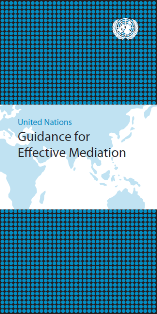Material de orientación

Esta guía de la ONU DAP, ahora DAPCP, busca informar a los mediadores y sus equipos, así como a las partes en conflicto, sobre los principios y estrategias para la inclusión efectiva de las mujeres y la incorporación de una perspectiva de género en los procesos de mediación. La guía aborda la preparación de la mediación, el diseño de procesos inclusivos y temas sustantivos como los arreglos de seguridad, la participación, las constituciones, así como el lenguaje y la implementación de los acuerdos de paz desde una perspectiva de género.

Las Naciones Unidas exigen que sus mediadores aborden la violencia sexual relacionada con conflictos. Esta guía ofrece a los mediadores y sus equipos principios y estrategias para incluir esta crítica preocupación de construcción de paz y seguridad en los acuerdos de cese al fuego y de paz.

El Secretario General elaboró las Directrices de las Naciones Unidas para una mediación eficaz en respuesta a una petición de la Asamblea General (A/RES/65/283). Las Directrices establecen una serie de fundamentos clave que deben tomarse en consideración en los procesos de mediación: preparación; consentimiento; imparcialidad; carácter inclusivo; implicación nacional; derecho internacional y marcos normativos; coherencia; coordinación y complementariedad del esfuerzo de mediación; y acuerdos de paz de calidad.
Recursos
Sitios web
WPS Dashboard on UN Women's Data Hub
Gender Expertise in Special Political Missions
Inclusion of Gender Provisions in UN-mediated Peace Agreements
Representation of Women in Formal UN-led and co-led Peace Negotiations
Publicaciones
Naciones Unidas:
DAPCP ONU (2020), De las palabras a la acción: La experiencia de las misiones políticas especiales de las Naciones Unidas en Colombia en materia de mujeres, paz y seguridad. [50 paginas] Executive Summary - From Words to Action: The Experience of UN Political Missions in Colombia on Women, Peace, and Security [8 pages]
DPPA de la ONU y ONU Mujeres (2020), COVID-19 Y CONFLICTOS: FOMENTAR LA PARTICIPACIÓN SUSTANTIVA DE LAS MUJERES EN LOS PROCESOS DE PAZ Y ALTO EL FUEGO, Nueva York: Naciones Unidas.
